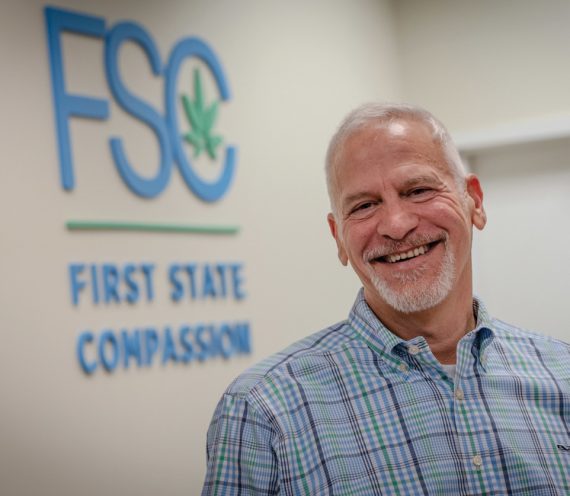
The news is spreading.
More and more patients in Delaware are finding relief with medical marijuana. Doctors are better understanding the fact that marijuana can have restorative and therapeutic benefits. As CEO of Delaware’s first medical marijuana dispensary, I can tell you that nothing is more satisfying than when I witness a patient’s improved physical health and emotional well-being.
Every day, patients tell us how grateful they are to have access to this medicine. Many of our patients have never used marijuana before, so the support they receive from the First State Compassion staff is critical to their success.
The state regulates the process of qualifying for a Medical Marijuana card; you must meet the following qualifications:
- 18 years of age or older, or a pediatric patient with parental consent
- Diagnosed with a qualifying medical condition – the list of conditions can be found on our website
- Have a Physician Certification from a Delaware-licensed MD or DO
- Delaware resident with proof of residency (DE Driver’s License or DE State ID)
What we know about medical marijuana
The marijuana plant (also known as cannabis) has medicinal properties that have the ability to manage pain, reduce nausea and diminish some types of seizures and muscle spasms. The active ingredients of marijuana are called cannabinoids, which can be integrated into varying products and can bring relief from pain and suffering.
Medical marijuana is a highly controlled medication that is available to Delawareans in many forms: capsules, oils, tinctures, concentrates, pre-rolls, topicals, sublinguals and chewable tablets.

Louise Louis, FSC Patient Engagement & Education Specialist, guides new patients through the medical marijuana process. “We have outstanding literature and support materials on the medicine – education and understanding are key to a patient’s success,” she says.
Women and medical marijuana use
Did you know that more women than men are likely to suffer from diseases such as Alzheimer’s Disease and arthritis? Medical marijuana treats these and other conditions that are prevalent among women. So, it’s no surprise that recent surveys show women are steadily narrowing the gender gap of patients using cannabis as part of their health and wellness plan.
Here are a few of the common diseases that qualify for medical marijuana:
- Alzheimer’s. Almost two-thirds of Americans with Alzheimer’s Disease are women. For those suffering from the ailment, it’s important to know about the relationship between medical cannabis and Alzheimer’s. Cannabinoids and other components of medical marijuana can offer anti-inflammatory properties to treat symptoms, and recent research by the Salk Institute for Biological Studies confirms that cannabis can decrease amyloid beta accumulation in the body’s cells, which is critical for slowing progression of the disease.
- Arthritis. Arthritis affects women more than men. Women are two times more likely to suffer from fibromyalgia as men, three times more likely for rheumatoid arthritis, and nine times more likely for lupus.
Cannabis can act as an anti-inflammatory agent. According to a study done by the University of Kentucky, applying certain cannabinoids topically can relieve inflammation as well as pain in conditions connected to arthritis. - Post-Traumatic Stress Disorder (PTSD). PTSD can impact women and men equally. It is most commonly associated with veterans, but can develop after a stressful, frightening or distressing event, or after a prolonged traumatic experience. One reason for PTSD is endocannabinoid deficiency, which can lead to chronic anxiety and severe impairment of the ability to carry on the activities of daily life. By resolving this deficit, the cannabinoids in marijuana can play a therapeutic role in bringing PTSD patients relief from their traumatic feelings or memories.
- Cancer. Cancer is the second most common threat to a woman’s health, accounting for 22 percent of female deaths in the United States each year. Medical marijuana can be useful in treating the side effects of cancer and cancer treatment, such as pain, inflammation and nausea. Laboratory studies in mice show that cannabinoids may inhibit cancer tumor growth and kill cancer cells while protecting normal cells.

Is Medical Marijuana Right for You?
Ask your doctor. Have the conversation. Relief could be closer than you think.

